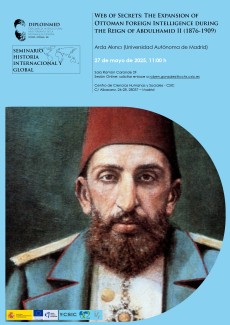Seminario conjunto DIPLOINMED+Historia Internacional y Global: "Web of Secrets: The Expansion of Ottoman Foreign Intelligence during the Reign of Abdulhamid II (1876-1909)"
Sala Ramón Carande 2F
Por Arda Akıncı (Universidad Autónoma de Madrid)
Organiza: Rubén González Cuerva (Proyecto DIPLOINMED) y Pablo León Aguinaga (Seminario de Historia Internacional y Global)
Resumen: The nineteenth century brought significant changes in the collection and institutionalization of secret intelligence; a development not confined to western world. This era marked a heightened emphasis on international diplomacy. During the long nineteenth century, the Ottoman Empire also underwent continuous reforms, extending beyond the Tanzimât Edict, reshaping its state mechanisms, bureaucracy, and imperial ethos. These reforms profoundly influenced the Empire’s intelligence practices and approach to international politics and diplomacy. They facilitated the creation of more centralized, professionalized foreign intelligence networks that were increasingly geared towards safeguarding the Empire’s interests in an era of growing foreign intervention and competition. These changes culminated during the reign of Sultan Abdulhamid II (1876-1909), a period defined by his personal rule and the peak of state professionalization, reflecting nearly a century of bureaucratic and social transformation.
A defining feature of the Hamidian Era was the pervasive sense of insecurity among the imperial bureaucrats and the Palace, driven by both internal and external threats. The rise of revolutionary and political opposition movements and the growing European colonialism and Russian imperialism compelled the Empire adopt additional security measures. These included expanding foreign intelligence networks through embassies and participating in European efforts to counter anarchist threat. In this way, by the early twentieth century, Ottoman diplomatic missions became crucial parts of the state’s intelligence apparatus, gathering covert and overt information on issues deemed critical to the Empire’s survival.
This research examines the expansion of the Ottoman diplomatic network and the role of its embassies in intelligence gathering and secret investigations, including collaborations with private detective agencies like Slaters in Great Britain and Pinkerton in the United States. It relies on underutilized primary sources, such as diplomatic correspondences from Ottoman embassies, intelligence reports shared with the Palace and the Ministry of Foreign Affairs, and communications between embassies and private detective companies, collected from the Ottoman and foreign archives. By analyzing these sources, the study aims to contextualize Ottoman foreign intelligence within a global and transnational framework, highlighting how the Empire adapted its diplomatic and intelligence practices in response to the rapidly changing geopolitical landscape of the late nineteenth century to safeguard its existence.
Grabación del seminario



